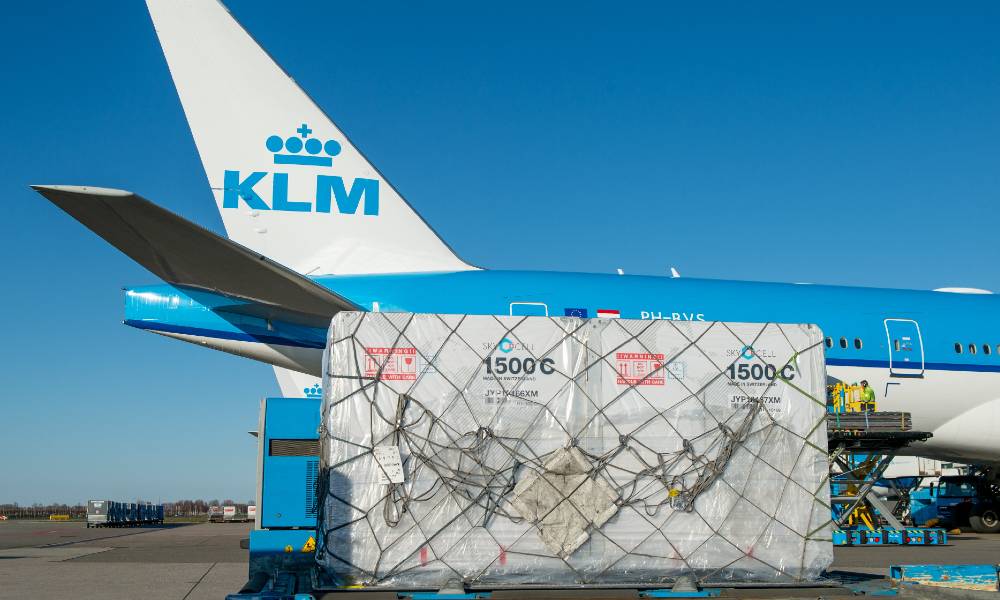
AFKLMP Cargo partners with SkyCell to expand access to hybrid containers
The new deal is part of a shift towards the adoption of enhanced technological solutions to meet both the demands of pandemic logistics and requirements of environmental agreements.

SkyCell and Air France KLM Martinair Cargo have signed a partnership agreement to expand access to SkyCell’s hybrid containers in supply chains, enabling further safety and sustainability solutions for pharmaceutical shipments. The new deal is part of a shift towards the adoption of enhanced technological solutions to meet both the demands of pandemic logistics and requirements of environmental agreements.
The agreement coincides with rising demand for greener solutions and ambitious environmental goals set out by pharma companies. As the pharma logistics industry pushes to prepare for a future global distribution of Covid-19 vaccines, sustainable solutions will be crucial given the volume and global scale of the distribution ahead. Since SkyCell’s solutions are able to secure products within a temperature range of 2°C to 8°C and 15°C to 25°C and now -60°C to -80°C, SkyCell is well-prepared for the varying needs of vaccines and other sensitive pharmaceuticals.
Chiara Venuti, director of Business Development & Airline Partnership, SkyCell, stated, “Due to our shared vision of providing the highest quality standards in the supply chain of temperature-sensitive products, our collaboration will ensure that our clients are guaranteed a safe, secure and sustainable service.”
The deal with Air France KLM Martinair Cargo is part of a shift towards the adoption of enhanced technological solutions to meet both the demands of pandemic logistics and requirements of environmental agreements. For the 16th consecutive year, Air France-KLM secured a place in the top three of the Dow Jones Sustainability Index (DJSI) Airlines category in November 2020.
Enrica Calonghi, global head, Pharmaceutical Logistics at Air France KLM Martinair Cargo, said, “Shipping pharma and healthcare products is a core activity for AFKLMP Cargo. Partnerships, such as those with our container suppliers, play a crucial role in the entire chain, especially when it comes to guaranteeing the necessary quality, reliability and connectivity. Together, we are ready to play a key role in the distribution of Covid-19 vaccines, thereby helping to ensure that as many people as possible around the globe will have access to vaccines in these challenging times.”
All SkyCell containers help to eliminate medical waste ending up in landfill by preventing product damage as they move around the globe. Tracked with IoT (Internet of Things) sensors, the hybrid containers monitor the temperature conditions inside and outside the containers to secure the full efficacy of pharmaceuticals is maintained until they reach patients. In the process, they reduce a shipment’s carbon footprint by up to 50 per cent due to their capability to charge independently without the need for dry ice and electricity. Across the company's client base, the containers provide protection on average for about 202 hours (8.4 days), which is extended by trucking or storage under refrigerated conditions. They have been known to secure medicine even under extreme climate conditions swinging between as low as -30°C and as high as +70°C. That means, if there is high demand for fast-paced deliveries to all corners of the world to defeat the Coronavirus pandemic, the hybrid is ready to tackle the differing infrastructures and climates of these countries together with the support of airlines around the world.
“Air France KLM Martinair Cargo is a pioneer in pharmaceutical airfreight and, like SkyCell, is committed to minimising its environmental footprint through technological innovation,” said Richard Ettl, CEO SkyCell. With the reintroduction of SkyCell’s hybrid container to Air France KLM Martinair Cargo’s existing range of pharma container offering, clients can choose to move a step closer to meeting their sustainability goals and simultaneously maintain high standards of safety for their pharmaceutical cargo.

